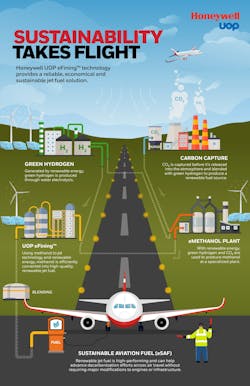Honeywell announces tech to turn hydrogen and CO2 into lower-carbon aviation fuel
NEW YORK - Honeywell International Inc announced on Wednesday a new technology to produce lower-carbon aviation fuel from green hydrogen and carbon dioxide captured from industry, which can help cut greenhouse gas emissions from aviation, one of the hardest sectors to electrify and decarbonize, Stephanie Kelly reports for Reuters. Continue reading original article.
The Military & Aerospace Electronics take:
11 May 2023 - eFuels, also known as electrofuels, are a class of synthetic fuels that can replace conventionally produced fossil fuels. eFuels combine green hydrogen (i.e., hydrogen produced in electrolyzers from renewable energy and water) and carbon dioxide (CO2) to produce eMethanol, which can then be converted to a wide range of sustainable fuels, including eSAF, eGasoline, and eDiesel.
Honeywell's UOP eFining is a methanol to jet fuel (MTJ) processing technology that can convert eMethanol to eSAF reliably and at scale. The technology is efficient, resulting in high-yield eSAF production at a lower cost relative to comparable technologies. Honeywell UOP eFining can reduce greenhouse gas (GHG) emissions by 88% compared to conventional jet fuel1. When blended with conventional jet fuel, eSAF is a drop-in replacement fuel that requires no changes to aircraft technology or fuel infrastructure.
Demand for SAF continues to grow. In 2021, the Biden Administration announced its Sustainable Aviation Fuel Grand Challenge for the U.S. aviation fuel supply sector to produce at least three billion gallons of SAF per year by 2030 and reduce emissions from aviation by 20%, with an eventual goal of meeting 100% of U.S. aviation fuel demand with SAF by 2050. The European Council released its ReFuelEU Aviation rules as part of the 'Fit for 55' package, which aim to increase the share of sustainable fuels at EU airports from a minimum of 2% in 2025 to 70% by 2050, with an additional subtarget for eSAF of 1.2% by 2030 and 35% in 2050. These and other incentives, including the Inflation Reduction Act, are intended to accelerate commercialization of technologies like Honeywell UOP eFining to help meet the growing demand for SAF.
Related: United Airlines backs algae-based fuel producer Viridos
Related: Honeywell and WPI to study hydrogen storage and power generation for aviation
Jamie Whitney, Senior Editor
Military + Aerospace Electronics
